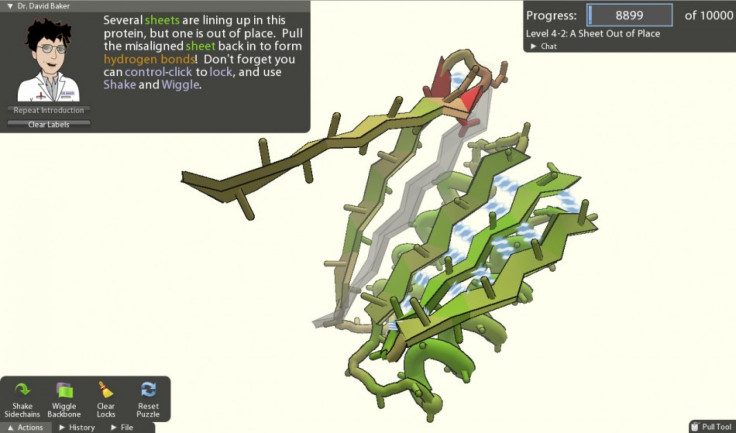Online Gamers Succeed Where Scientists Fail, Opens Door to New AIDS Drug Design

How exactly did the proteins in AIDS-like viruses fit together was a nettlesome molecular puzzle that stumped biochemists for years. But online gamers have managed to solve the structure of the retrovirus enzyme.
After trying and repeatedly failing to piece together the structure of a protein-cutting enzyme from an AIDS-like virus, scientists called in the Foldit players to help get the job done.
Foldit is a computer game that allows players to collaborate and compete in predicting the structure of protein molecules. It was created by computer scientists and biochemists at the UW Center for Game Science, and by paper co-author biochemist David Baker of UW. It was developed to engage the general public in scientific discovery.
The scientists challenged the online gamers to produce an accurate model of the enzyme. Scientists say this class of enzymes, which is called retroviral proteases, has a critical role in how the AIDS virus matures and proliferates.
There are intensive research being done in order to try to find anti-AIDS drugs that can block these enzymes. However, those efforts were hampered by not knowing exactly what the retroviral protease molecule looked like.
We wanted to see if human intuition could succeed where automated methods had failed, said biochemist Firas Khatib of the University of Washington (UW).
The gamers pulled through and generated models that were good enough for the researchers to refine and determine the enzyme's structure within a few days.
Scientists say it is also equally amazing that the surfaces on the molecule stood out as likely targets for drugs to deactivate the enzyme.
These features provide exciting opportunities for the design of retroviral drugs, including AIDS drugs, Khatib and co-authors of the paper wrote in the journal Nature Structural & Molecular Biology.
All the scientists and the online gamers are listed as co-authors.
Online gamers have solved a longstanding scientific problem, perhaps leading the way to new anti-viral drugs, said Carter Kimsey, program director in the National Science Foundation's (NSF) Division of Biological Infrastructure, which funded the research. After this discovery, young people might not mind doing their online science homework. This is an innovative approach to getting humans and computer models to 'learn from each other' in real-time.
Scientists said the solution of the virus enzyme structure is an indication of the power of online computer games to channel human intuition and of three-dimensional pattern-matching skills to solve challenging scientific problems.
The online protein folding game draws thousands of avid players from all walks of life and it taps into their 3-D spatial abilities to rotate chains of amino acids in cyberspace.
Seth Cooper, a computer scientist at UW, is a co-creator of Foldit and its lead designer and developer. Cooper also co-authored the paper and he studies human-computer exploration methods and the co-adaptation of games and players.
People have spatial reasoning, something computers are not yet good at, Cooper said.Games provide a framework for bringing together the strengths of computers and humans. These results show that gaming, science and computation can be combined to make advances that were not possible before.
© Copyright IBTimes 2025. All rights reserved.






















